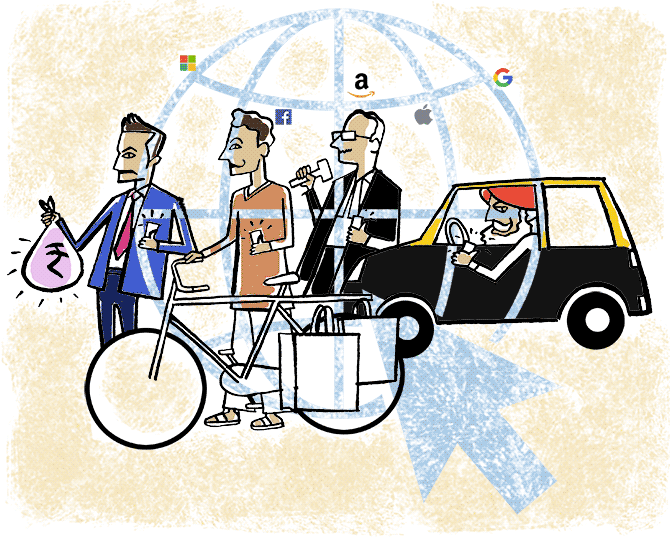Ajit Balakrishnan on how the Web could return to its original egalitarian goals.
Illustration: Dominic Xavier/Rediff.com

It all started in 1989 with an inter-office memo, describing in very humble words a '...way to link and access information of various kinds' in which the user can browse at will. [through] a single user-interface to large classes of information (reports, notes, data-bases, computer documentation and on-line help...'
That was Tim Berners Lee, an Englishman, and his colleague, R Cailliau, working at the CERN, the European Organization for Nuclear Research, located just outside Geneva.
After describing some of the technical aspects, it proposed its ends with the goal 'to provide the software for the above free of charge to anyone'.
Starting from this universalistic desire to make all sorts of information available for free to all comers, how did we end up in a disconcerting world dominated by five American companies that The New York Times recently called 'The Frightful Five', who are alleged to be complicit in providing the tools to fix the election of the current American President Donald J Trump and for British voters' shocking Brexit vote -- Britain's exit from the European Union?
And a world where the European Union has just brought into effect very strict rules and hefty financial penalties for wrong use of its residents' data.
And a world where the Right to be Forgotten is beginning to be seen as a fundamental human right!
Social networks, originally conceived as places where like-minded people could gather and chat about either arcane subjects, such as programming languages or societal injustices, or merely flirt, are suddenly being viewed with suspicion.
Will my opinions on societal injustices or who I flirted with be used against me in some other context?
Will data about products I expressed an interest in on a shopping site or how often I opened and read a free newsletter be used against me somewhere else?
Being an early follower of the World Wide Web and its innocent and egalitarian goals, I nowadays find myself drifting into a reverie like some of us do when childhood memories of loving parents and happy schoolmates come back.
I then pinch myself awake and ask myself are all the bad things being said about the Web and its players just another example of NeoLuddism (in case you have forgotten your high school history, the Luddites were a radical group of English textile workers and weavers, who in the early 19th century destroyed textile machinery as a form of protest against the Industrial Revolution)?
In that sense, are the protests against possible misuse of user data an attempt to 'destroy the machinery' of the Information Revolution?
Or is it a surrogate protest against the worldwide dominance of five American companies, against whom the only form of protection appears to be to close your borders against them as China has done?
Just 'protectionism' to help your national players?
Even the question about how these five American companies came to achieve such dominance is not easy to get a consensus about. One common strand of thought points to their technical and financial deep links with the American government.
To start with, the Internet was built at the instance and full financial support of the US department of defense.
That same entity, which unlike other countries' defence departments, does a very good job of posing challenging technical problems and funding the solutions for these problems, provides an indirect support to these American tech companies.
There is an excellent scholarly account of this in Sussex University Professor Mariana Mazzucato's book, The Entrepreneurial State: Debunking Public vs Private Sector Myths, which makes the point that it is the US department of defense, not venture capitalists and tech visionaries, that has given US tech companies the elixir.
She uses the iPhone as an example to show how practically every element of the technology in her beloved device is an outcome of such defence projects: The multi-touch screen, the GPS system, the microprocessor, the memory device, cell phone technology and, most of all, the Internet itself.
The basic learning here is to see, in India, for example, how our own defence establishment can similarly stimulate technology and product development.
What is really worrying about this is in this frenzy of anxiety about 'Data Protection', 'Privacy', 'The Frightful Five' and so on, we need to focus our policymaking effort to get the best of the Web for our ordinary citizens.
For example, help India's kirana shops that provide 50 per cent of employment in India (particularly for young Indians dropping out of school at Class 10 for economic reasons) use the Internet to increase their service quality and profitability (not silently watch them being destroyed by private equity-funded price-subsidised e-commerce players), help our kaali-peeli taxi drivers/owners grow (not silently watch them being destroyed by private equity-funded price-subsidised taxi players), help our courts bring down their years-long waiting list (not silently watch the legal industry profit at the cost of citizens by repeated postponement of hearings), and perhaps, most of all, create a domestically-owned large enough number of early-stage venture equity funds (not be a slave to foreign-owned ones who will fund only models that have worked in their home countries).
These are the just some of the ways that could help in returning the web to its original egalitarian goals in India.
Ajit Balakrishnan, founder and CEO of Rediff.com, is the author of The Wave Rider, A Chronicle of the Information Age. You can reach him at ajitb@rediffmail.com











 © 2025
© 2025